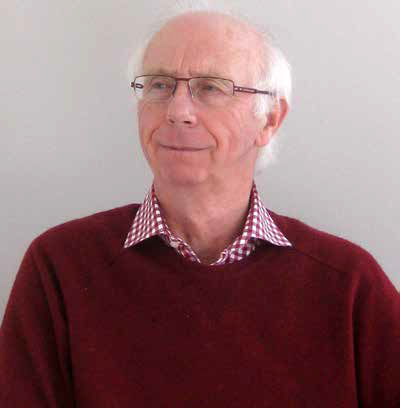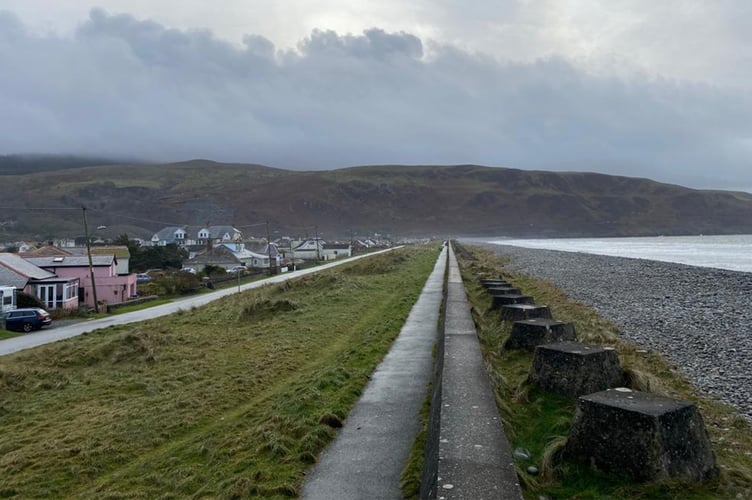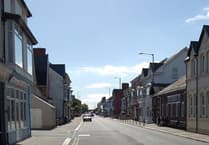“I remember a certain professor, a past Borth resident, who was so upset he never spoke to me again after I wrote the piece.”
World-leading hydrologist and flood expert Professor Tony Jones, aged 80, recalled the reaction to an article he published predicting low-lying coastal communities along Cardigan Bay, in particular Borth, would soon become vulnerable to the effects of climate change.
This was in 1990. Long before former US Presidential candidate Al Gore’s An Inconvenient Truth, Swedish teenage climate campaigner Greta Thunberg and only two years after the first meeting of the then-little known UN Intergovernmental Panel on Climate Change (IPCC).
Professor Jones, who has lived in and around Aberystwyth for about 50 years, has been ahead of the curve and challenging consensus since he started his academic career in 1967 – and he is not afraid to deliver rude awakenings.

The King’s College London and Cambridge University academic has gone on to advise international conservation body, UNESCO, and western military alliance, NATO - despite being frustrated by the barriers to progress in the world of politics.
The Cambrian News sat down with him to discuss the future of the Welsh coastline, his pioneering field research into flooding and the impact of his long and distinguished career – as well as his love for Ceredigion.
Professor Jones was the first to study and map a natural network of soil pipes that enable an underground flow of water from hills and mountains down into rivers and streams.
The significance of this discovery is that the drainage enabled by these formations dramatically improves biodiversity and the health of the soil – as well as increasing the velocity of flooding.

When he was a student, he recalled sitting on a river bank in Derbyshire and, rather fatefully, he noticed strange holes leading into the water.
He spent years of his life studying these holes and the natural pipes which formed them. He said water can infiltrate particular types of soil before it reaches an impermeable layer, over which it flows sideways – boring these tunnels into the earth.
“And then the water gets in and starts eroding away – creating a tunnel underneath – and then that perpetuates itself and when the heaviest rains come, it runs underneath the ground very quickly,” he said.
“People used to believe any water that enters the soil was lost to the floodwaters because it was so slow seeping through but when you’ve got these natural pipes in the soil it speeds the whole thing up.
“So, we proved they could deliver up to 50 per cent of the flood waters to the streams.”
Many of these discoveries were made in the Welsh hills and mountains after Professor Jones accepted a lectureship at Aberystwyth University in 1973.
“We found that the surface infiltration capacity over these pipes was higher than the area where the pipes weren’t, so that has implications for the development of the soil profiles,” he continued. “It has implications for vegetation so it increases biodiversity."
It is easy to imagine the speed of the floodwater cascading through these pipes compared to the slow travel of rainwater on the surface.
But commercial scientists and engineers - often involved with infrastructure and property development - still don’t account for this ‘throughflow’ when modelling flood risks. Neither do they fully harness the ecological power of the soil pipes for the good of the environment.
Though much of Professor Jones’ early research took him up Maesnant, Nant-y-Moch and Pumlumon in the Cambrian Mountains, his work did eventually head downstream.
He and a team of scientists mapped the low-lying coastal regions susceptible to flooding and sea level rise as part of a programme for the BBC in 1990.
The Cambrian News has written reports on the situation facing the villages of Borth and Fairbourne – and the very real possibility authorities will no longer defend them from being lost to the sea.
“There are three components to it,” said Professor Jones. “One is sea level rise, which has accelerated in recent decades, the other is increase rainfall in the mountains – as the atmosphere warms up you get more evaporation – so the air can hold more moisture and you get more convection, so you get more storms.
“This means you get heavier rainfall in the mountains. No question about that.
“The other factor is increased storminess as we’ve seen in recent years.
“And if high tide coincides with heavy rainfall in the mountains, you get a backup – a ponding – of the water in the estuary. Which also causes floods.”
He fears flooding will eventually attack Borth from behind, when the banks of the river Leri burst onto the flood plain.
As the Cambrian News reported, models from charity Climate Central suggest seasonal flooding could become so severe over the next couple of decades that life in the village could become very challenging – while Ynyslas could be completely submerged even sooner than this.
“I would be a bit sceptical really," Professor Jones said. “I err on the optimistic side.
“I would say it will be the end of the century before we really have a severe problem.
“The problem is the three factors that I mention in combination – how strong the winds are, as well as sea level rise as well as rainfall in the mountains and whether they’re coinciding or not.
“It’s a matter of timing and intensity. And it depends how much (flooding) you can stand before you have to move out.”
On why he believes serious effects won’t be felt until the end of the century, he said: “Well, simply because you can improve the defences. It’s really a decision about how much money you want to spend.
“You can put defences at the back of the Leri but they haven’t done that yet even thought it would help – so it depends on value judgements and political will.
“The big questions are about how long residents will be prepared to suffer the storm damage and how much everyone is prepared to spend to mitigate the problem.”
He was also sceptical about the ability of environmental regulators such as Natural Resources Wales (NRW) as well as other conservation organisations being able to deliver such crucial projects within increasingly tight budgets.
He was particularly encouraged about the future of Borth which he saw as rather different from Fairbourne in Gywnedd – which was until recently expected to be ‘decommissioned’ by 2054, with authorities indicating they would spend no more money to protect it.
“I’m glad to see that there is no more talk of decommissioning Fairbourne, but it is less well established than Borth with half the population and upper Borth will be safe regardless.
“But Fairbourne faces the same problem in that any proposals for augmenting sea defences have concentrated on the seaward side, but the estuary side is a more significant threat just as in Borth.”
Looking to the long term, Professor Jones delivered perhaps his most optimistic insight yet.
Due to climactic forces, he says, sea level rise will begin to slow in around a century and the UK and Wales will get fewer storms and floods.
“There’s an in-built reservoir of heat in the oceans that is causing its continuous expansion but after the ice in the arctic and the Antarctic has melted - and this is long way off, I know - there will be a general reduction in the increase in sea level rise,” he said.
“Meteorologically, or climatologically, we’ve seen desertification moving into the Mediterranean and that is the result of what is called the Hadley Cell – obviously the equator is the warmest place on earth and the air rises there and then it sinks as it comes into a higher-pressure area of the atmosphere, expanding into the Mediterranean and pushing, in the end, the westerly winds further north.”
The Hadley Cell, also known as the Hadley circulation, is a global-scale tropical atmospheric circulation. It affects the global climate, prevailing winds and the jet stream - fast flowing air currents in the atmosphere, affecting the weather of the UK and nearby nations.
He continued: “So, the jet stream could also shift a bit northwards and as it does it will reduce the storminess here. The jet stream is trying to even out the temperature difference around the world by shifting warm air poleward to warm polar regions. But if you reduce the temperature difference between the equator and the pole, you reduce the strength of the winds and that reduces the intensity of storms and the strength of the jet stream – and that buys more time for low-lying coastal areas.
“If people haven’t given up (on Borth and Fairbourne) already by that time.”
He cautiously accepted that if an effort was made by authorities to shore up defences for another several decades – it could well be a wise investment and save coastal communities from slow and painful abandonment.
Later in his career, Professor Jones went on to influence and inform policy-making, stamping his authority on the academy in other fields such as sustainability and climate science.
In 2008, Professor Jones’s first paper on subsurface contributions to flooding was acknowledged by the International Association of Hydrological Sciences as one of only 30 benchmark research papers published since the beginning of modern hydrology.
He established the Commission for Water Sustainability which brings together leading scientists, geographers and hydrologists from across the world to share and write about the future of the planet and its relationship with water.
In 2014, he was asked to assess UNESCO’s International Hydrological Programme.
He said: “That was very interesting and the politics of it were very interesting too - in terms of what they’d accept and what they wouldn’t.
“They tried redacting my report all over the place and when I was sat in some UN-style roundtable – with representatives from countries all over the world.
“They interrupted me and put in their own man to give their own side of things. I followed him and told the audience you’ve heard many good things it is doing so I will just focus on issues that need improving. This was warmly supported by a number of delegations, especially Japan, Holland and the UK.
“We identified programmes that they needed to improve and introduce and so on – and they were quite resistant about that.”
He accepted that his experiences saw him lose some faith in the effectiveness of such organisations in solving the world’s problems.
One of the projects he’d recommended to the panel focused on river pollution.
He claimed, rather extraordinarily, that efforts to combat such pollution from the 1970s onwards had actually got worse.
He referenced agricultural pollution in Welsh rivers and the damage being caused by harmful chemicals – mostly by-products of farming practices - such as nitrates and phosphates, as the Cambrian News has reported.
“But elsewhere drugs in the water supplies are becoming a problem,” he said.
“Not so long ago I was in Turin inspecting the water supply and they told me that they had discovered metabolites of cocaine around the intake of the main water supply from the river Po.
“That’s not an isolated case. It is increasing around the world with leisure drugs and particularly medicinal drugs found in sewage polluting rivers.”
More recently he wrote a book and organised a NATO conference on global water security – and how it is threatened by war and terrorism. He said the issue has risen to a head recently due to Vladimir Putin’s disastrous invasion of Ukraine, in which he has repeatedly targeted water and power supplies.
Professor Jones concluded by paying tribute to Wales and Ceredigion. He said he loves the lifestyle and couldn’t imagine a better place to have raised his children.
He described Ceredigion as an ‘undiscovered gem’ - with the same natural beauty as Pembrokeshire but without the ‘hordes of tourists.’
Looking to the future, Professor Jones said: “The Ukraine war has set things back a bit and coal and oil will continue to be used for quite some time.
“Some scientific predictions are a little too extreme. There’s a lot we don’t know yet and models are getting more sophisticated every day.
“But the current traumas in the world (namely Ukraine and damage caused by former US President Donald Trump) will have to pass away before we can get back on track.”

.jpeg?width=209&height=140&crop=209:145,smart&quality=75)



Comments
This article has no comments yet. Be the first to leave a comment.